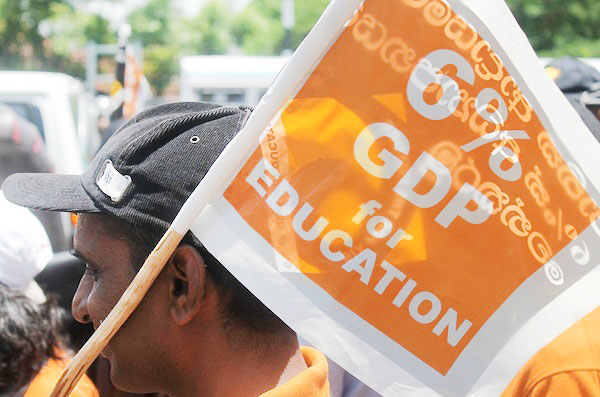Universities from thin air
* Lankan universities have been running with no more than 60 percent of the cadre of teachers approved for them and now perhaps less.
* Upper secondary schools are run with no teachers for mathematics, physics and information technology.
* University teachers are emigrating in droves, driven away into uncertain lives in other countries.
*In modern universities,laboratories with sophisticated equipment are essential for teaching and research.
* Such equipment becomes far more expensive where teaching and research are in technology, whether old or new.
* Most good work in climate change requires powerful comput-ers and heavy data storage.
* Who advises the President on university matters and who writes these speeches for him?
By Usvatte-aratchi
Soon after he took office as President of the republic, Ranil Wickremesinghe presided over the annual meeting of the Asian Development Bank in Manila and announced a proposal to establish a university in Sri Lanka to study global climate change. A few weeks ago, at a prize day at a school, he announced that he would establish 10 more universities in the country. On 17 September, when he spoke at a meeting of the Group of 77 in Cuba, he announced that he had plans to establish four universities in Sri Lanka, devoted to studying new technologies. In all 15 universities. There were no dates when these good things will dawn in Sri Lanka.
These are astonishing initiatives from the head of state and government of a country steeped in unpaid debt, to pay back which this society will scrape the barrel hurting its bottom. The President himself is in office for the period which ends in 2024, less than 12 months from now. He also is the Minister of Finance in the country. Many decades ago, he was a university student and a few years after graduation he was the Minister of Education in a powerful government. With all these elements in his life, he ought to know more about universities than most members of his present government. Universities in the country have been running with no more than 60 percent of the cadre of teachers approved for them and now perhaps less. Upper secondary schools in the country are run with no teachers for mathematics, physics and information technology. Teachers in universities are emigrating in droves, driven away into uncertain lives in other countries. Who advises the President on university matters and who writes these speeches for him? They should know some elementary things about universities and the kind of resources required to bring up a good university and possess some discernment about the availability of resources in the country. A roughly parallel experience from Nigeria comes to mind. In 1975, there were 13 universities with 44,000 students in Nigeria, in 1980 26 universities with 82, 000 students. ‘Government revenue jumped from US$ 4.733 billion in 1975 to US$10.1 billion in 1979.’ (Exporting larger volumes of petroleum at rising prices.) That was as realistic as President Wickremasinghe’s announcements are fanciful.

Teachers demanding more funds for education
Universities grow and prosper now because gifted teachers who are also outstanding researchers work there. Such teachers attract students of high ability to study and research under them. You will probably recall the recent work of a student from India, Rishi Atul Rajbopat on a scholarship funded by an Indian foundation and working with Professor Vincenzo Vergiani, an Italian in the University of Cambridge, who (Rajbopat) solved a long-standing problem in Panini’s Samskrt grammar. A striking example from across the Atlantic is the development of an alternate philosophy of monetary economics in Chicago University consequent upon the work of Herbert Simon, Frank Knight, Jacob Viner and others. By the time Milton Friedman came out with his paper on money in 1967, several dozen teachers and students had worked on these ideas in Chicago. The university and the community must accommodate teachers and students. When present teachers abandon their post in large numbers, one must ask what would turn the situation around for good scientists and teachers to come to work here.
In modern universities, laboratories with sophisticated equipment are essential for teaching and research. This equipment becomes far more expensive where teaching and research are in technology, whether old or new. Most good work in climate change requires powerful computers and heavy data storage. Engineers spend more time in laboratories than teachers and students in most other disciplines. Laboratories emerged into high prominence in university education in the second half of the 19th century. The Cavendish labs in Cambridge are symptomatic of this transformation. German research institutions and universities were prolific in their output of findings in mathematics, physics and chemistry. Soon universities and research institutions (e. g. Bell Labs in New Jersey) in the United States took the leadership. The expulsion of outstanding and highly productive young scientists and mathematicians, who happened to be Jews, from Europe accelerated the rising trend of scientific research in both Britain and the United States. (One is reminded of the emigration of skilled silk spinners and weavers from around Lyons, who happened to be dissenters (Quakers) from the Catholic faith and the fillip they gave to the development of technology in the textile industry in northern England.) Powerful leaders who advised heads of state and government on scientific matters persuaded their governments to promote science and technology in universities. The work of Vannevar Bush of MT who advised President Roosevelt on the promotion of mathematics and science in American college and universities come to mind. The emergence of US science and technology in the 1950s was the direct result of those initiatives.
This economy and this society are in no position to take the initiatives that the President put forward. Nobody questions the value of those initiatives in an imaginary world of a plenitude of resources. In this land today they are simply fanciful.



